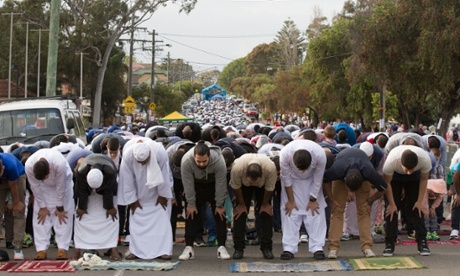Islamic women’s groups have welcomed a call by the peak body for Australia’s Muslim clerics that imams around the country should use their sermons this Friday to denounce domestic violence.
The president of the Australian National Imams Council, Imam Abdel Aziem, has appealed to Islamic religious leaders to speak out against family violence in their khutbah, a sermon usually delivered before prayers on Friday, Islam’s holiest day of the week.
“It’s the religious duty upon men to treat their women folk with kindness, respect and mutual love and care. Islam disapproves of oppression and ill treatment of women,” Aziem said in a statement.
Domestic violence rates within the Muslim community are not known, but are thought to line up with national figures that show one woman is killed each week by a former or current partner.
The executive director of the Australian Muslim Women’s Centre for Human Rights, Joumanah El Matrah, said the national khutbah appeal was “a good start” by the exclusively male council. “The position imams take is extremely important,” she said.
“When I first started working in this area 14 years ago it was very difficult to put family violence on the agenda, it was considered a taboo subject,” she said.
El Matrah said the work of Islamic women’s groups had succeeding in raising awareness of the problem, although, just as outside the Muslim community, men were not always receptive.
“The resistance men have to addressing violence in the home always looks the same,” El Matrah said.
“They prioritise what they think is the wellbeing of the family over the wellbeing of the women in the family. It’s taken an extraordinary amount of time to make men aware that what makes for a healthy family is a woman’s safety in the home.”
Maha Abdo, who runs the United Muslim Women’s Association, said it was the first nationally coordinated effort by the exclusively-male council to address men’s violence against women.
Family violence within Australia’s varied Muslim community was driven largely by “cultural practices in certain countries”, against which Qur’anic principles could be a tool of empowerment, she said.
“Islamically, it’s very clear that violence against women is very much forbidden.”
Imams play an important role in contextualising passages within the 1,400-year-old religion’s holy book that appeared to subordinate women or condone their physical abuse, she said.
“A lot of people, due to their lack of understanding or awareness of Islamic traditions, don’t understand that a verse comes in context.” Domestic violence across all communities was driven by the same force, she said. “It’s a power issue.”
Jamila Hussain, a lecturer in Islamic law at the University of Technology, Sydney, said the khutbah appeal was “very commendable” and would be a wake-up call for men in the community who came from places “where women are not highly regarded and domestic violence is a matter of course”.
“The only way to get to these men is through the imams in the Friday sermon,” she said.
“Things are definitely changing in a number of areas,” Hussain said. “We have a grand mufti who is very active and very open and not overly socially conservative.
“And the Imam’s council is now younger and better educated, including a number who grew up in Australia and understand Australian society better.”
/149

